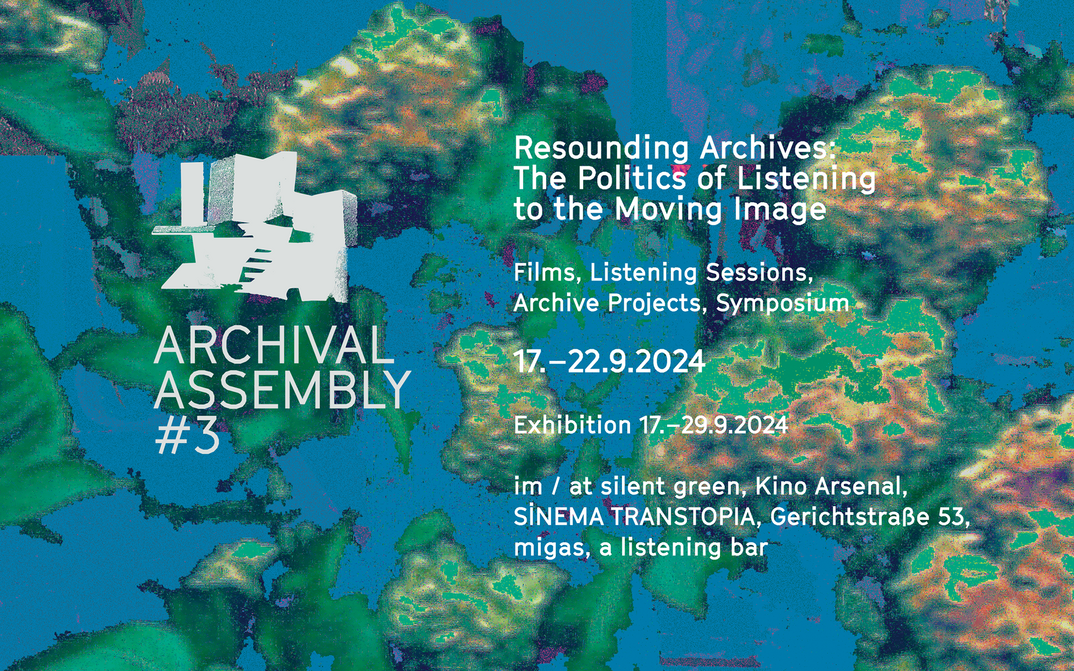Symposium Day Five - Resounding Archives: The Politics of Listening to The Moving Image

Sun 22.09.
10:00
Cinema
silent green Kulturquartier
zu dem KalenderFree admission
Sunday, September 22, 2024
10:00–11:30
Panel 9
Speaking Up
Since the 1960s, the primary task of independent, political, and militant cinema has been to lend a voice to those who would otherwise go unheard. These films were often created by collectives whose members not only developed new modes of production, but also a new distribution and cinema practice intended to have a transformative effect on socio-political life. In this context, programs and manifestos were created which continue to reverberate today.
Fiona Berg (Berlin) will discuss feminist networks, festivals, and manifestos.
Ahmeed Refaat (Cairo) will talk about the 2nd Afro-Asian Film Festival that took place in Cairo in 1960.
Moderation: Brigitta Kuster (Berlin/Zurich)
12:00–13:30
Panel 10
Pirate Sounds: Composing Histories From Acoustic Fragments and Debris
After found footage films came found sound music, the creative borrowing of not just styles, rhythms, and rhymes, but entire building blocks of musical compositions. The two most significant cultural movements of the last three decades in a global perspective, hip hop and Afrobeats, provide the outlines of a new cultural order which is also a re-ordering of a shared archive of images and sounds of emancipation.
Tom Simmert (Mainz) will speak of pirate media and YouTube archives in Nigerian music.
Aboubakar Sanogo (Ottawa) will discuss hip hop and how it remediates what we might call the “African Emancipation Library.”
Moderation: Erica Carter (London)
Fiona Berg is a film writer and researcher. In 2023, 50 years after the First International Women’s Film Seminar, she co-curated the festival feminist elsewheres at Kino Arsenal along with Arisa Purkpong, Sophie Holzberger, Charlotte Eitelbach, and Elena Baumeister. She also organized a research workshop parallel to the event at the Freie Universität Berlin. Previously, she managed print traffic and was active in the programming department of the German History Museum’s Zeughauskino, including series devoted to Gisela Tuchtenhagen and Claudia von Alemann. Her current research interests focus on the infrastructures of feminist film labor, collaborative forms of film education and activism as well as non-fiction forms of filmmaking.
Ahmed Refaat is a film and visual arts researcher, programmer, and curator. With a focus on research-based long-term projects, his work has produced film programs, discursive events, exhibitions, workshops, and publications. In 2019, Refaat co-founded de*sync, an experimental film night followed by a meal and a long discussion. He also reflects on art and cinema critically through writing reviews and research articles published in outlets including Madamasr, Alam El-Kotob, and Malafat NAAS.
Brigitta Kuster is a cultural researcher primarily interested in film studies, anti-, de-, and post-colonial approaches, as well as the study of the European border. She is currently a junior professor in the Department of Cultural History and Theory at Humboldt University of Berlin. Apart from her academic work, Kuster also has an international profile as an artist and cultural producer, including numerous curatorial works in the fields of film and contemporary art.
Tom Simmert is a researcher at the BMBF-funded project CEDITRAA (Cultural Entrepreneurship and Digital Transformation in Africa and Asia). He recently completed his PhD at Johannes Gutenberg University Mainz, Department of Anthropology and African Studies, with a dissertation entitled Afrobeats: Digital Music from Lagos to the World. His research interests are popular music and dance as digital cultural practices, specifically in West Africa and South Africa.
Aboubakar Sanogo is an Associate Professor in Film Studies at Carleton University in Ottawa, Canada. His writings have appeared in Cinema Journal, Moving Image Review & Art Journal, Journal of Film Preservation, Film Quarterly, Sight and Sound and Film Comment and the Journal of African Cinemas. As the North American Regional Secretary for the Pan African Federation of Filmmakers (FEPACI), he initiated and oversees the FEPACI Archival Project. He was instrumental in establishing African Film Heritage Project (AFHP), a major film preservation and restoration initiative in partnership with Martin Scorsese’s The Film Foundation and UNESCO in collaboration with the Cineteca di Bologna.
Erica Carter is Professor of German and Film at King’s College London. Her publications include the co-authored Mapping the Sensible: Distribution, Inscription, Cinematic Thinking (2022), Béla Balázs: Early Film Theory (2010), Dietrich’s Ghosts: The Sublime and the Beautiful in Third Reich Film (2004), and the BFI German Cinema Book (2nd ed. 2021). Her current research centers on colonial cinema and decolonial curatorial and archive practice in the Bahamas, Ghana, and Sudan.